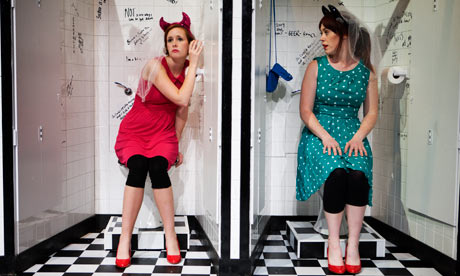
What does a drunk woman look like? Is she young or old, thin or fat? Is her dress too short, her high-heels impossible to walk in? What do you think when you see her: that she's just out having a laugh, or making an embarrassing spectacle of herself? Or, worst of all, that she's putting herself in danger? Asking for it, even?
These are the questions that Thirsty, a show devised and performed by the all-female theatre company the Paper Birds, sets out to answer.
Set in a trio of toilet stalls, the show kicks off with the two performers, Jemma McDonnell and Kylie Walsh, performing an exuberant, faux-drunken dance to Beyoncé's Single Ladies, and concludes with an impassioned, if off-key, karaoke rendition of Bonnie Tyler's Total Eclipse of the Heart. In between, they show off their hen-night T-shirts (hello, Juicy Jemma and Kinky Kylie), pull moonies, talk about their own relationship with alcohol, and recount a series of stories about women getting drunk: some hilarious, some heartbreaking.
These stories are culled, verbatim, from the real experiences that hundreds of women related to Walsh and McDonnell, anonymously, during their research. This began in January last year, when they decided to probe the endless headlines about "binge Britain" – only last month, David Cameron vowed to tackle Britain's "scandal" of alcohol abuse — in an effort to find out more about how much we really drink and how it makes us feel.
They gave out business cards reading: "Are you drunk? Ring this number and leave us a voicemail" (about 50 people did, though the tinny line made their messages unusable in the show). They set up an online questionnaire asking people what they drink, why they drink, and to tell them two stories – one funny, one serious – about their own drunken experiences.
At the last minute, they decided to include an extra, open-ended question: "Drunk women: discuss." The responses they received would change the direction of the show, leading to their decision to prioritise the experiences of women. "At first," McDonnell says, "we had no intention of making the show about women; we were thinking about 'binge Britain' in general – about what binge drinking really means. Then we put this question in, and the answers to it were so unexpected. Practically all our questionnaires, from both men and women, painted a very negative, very specific image of drunk women: as young, overweight, working-class, slaggish and hard to control."
Most of the respondents were young women, and the stories they told about drinking also gave Walsh and McDonnell pause for thought. Some – like the woman who said that whenever she had a few drinks, she would find the heaviest man in the pub and lift him up – were funny. Others were shocking; particularly one from a young woman who described going home from a club with a man who had sex with her and took photos while she was too drunk to know what was happening. "I couldn't say anything," the woman wrote. "It was my fault. I hated myself."
"When we read it," McDonnell says, "it was horrifying. We'd opened this up expecting stories of harmless drunken behaviour. We did get some of those, but then we started to get darker stories, of women like her, who are finding themselves in very dangerous situations."
Having set out to undermine the familiar trope that women's drinking leads, with a certain finger-wagging inevitability, to sexual violence, they were now faced with a real story that implied just that. "We wanted to discuss women's drinking and say, in a feminist way," McDonnell says, "that it's wonderful that young women now have this attitude that they can drink, and it's fine for them to do that. We almost didn't want to tell this other story — it seemed to be sending out the message that young women shouldn't be drinking, because look what can happen to them. But we couldn't just ignore the story, so we decided to tell it."
The number of women who regularly binge-drink (defined, officially, as consuming more than twice the government's recommended daily limit on at least one day a week) has risen over the past decade, though not at quite the rate the most headlines would have us believe. According to the Office for National Statistics, the number of women drinking more than 14 units a week rose from 15% in 1992 to 20% in 2006, and fell a little to 18% in 2009.
Rebecca Clough, head of campaigns for the alcohol advice charity Drinkaware, thinks that binge-drinking among both men and women remains a problem – and applauds the Paper Birds for tackling the subject. "I don't think we should refute the fact," she says, "that there is an issue with binge-drinking among a sizeable segment of our young people, and that this continues to influence how they drink as they get older. Any piece of theatre that tries to reflect our relationship with alcohol can only be a good thing."
For McDonnell, too, the show's aim is to hold a mirror up to the way women feel about alcohol, both positive and negative; and to attempt to undermine, by showing a multiplicity of women's experiences, those overwhelmingly negative stereotypes. "We have no illusions," she says, "that people are going to see the show and then stop drinking. That's not our intention. We want to embrace alcohol: it's a love-hate relationship. But we also want to make people think again when they see a drunken woman in the street; to think about how you respond to her and feel about her. We want it to be less simple for people to judge her."

